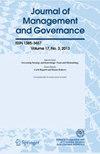Intellectual capital, innovation and the bushy form of knowledge capitalisation
IF 4
Q2 MANAGEMENT
引用次数: 0
Abstract
Abstract This paper analyses the relations between intellectual capital (IC) and innovation. It links interest in the macro-effects of intellectual capital, typically found in cross-sectional studies on the effects of intellectual capital, to micro-studies of the performativity of intellectual capital. The former literature suffers from a lack of attention to the mechanisms that produce innovation, and the latter suffers from its focus on stabilising decisions in uncertain situations. The paper draws on the notion of perlocutionary performativity, which, in addition to suggesting that IC provokes effects, underlines that particular directions of these effects are uncertain, if not unknown. To show the mechanism through which perlocutions work, the paper draws on Butler’s (1993; 1997) distinction between citability and ex-citability. According to this perspective, a citation of an IC corpus of expressions (citations, references, information) may be transformed, by being circulated (re-cited) and brought into a new potentially innovative arrangement, something which goes beyond (ex-cites) the cited reference. Over time, IC citations provoke innovation. Such a relation can be traced as a bushy form of innovation, which develops from a set of IC citations that have some durability in being reproduced regularly. The paper shows, through the analysis of two decades of reporting from Autostrade, that IC is both a set of disciplined citations of a particular kind of use value, a set of obligations to invest along this use value, and an unpredictable capitalisation of items of innovation.知识资本、创新与知识资本化的模糊形式
摘要本文分析了智力资本与创新的关系。它将对智力资本的宏观效应的兴趣(通常在智力资本效应的横断面研究中发现)与对智力资本绩效的微观研究联系起来。前一种文献缺乏对产生创新的机制的关注,而后一种文献则侧重于在不确定的情况下稳定决策。这篇论文借鉴了行为行为的概念,这一概念除了表明IC引发了影响之外,还强调了这些影响的特定方向是不确定的,如果不是未知的话。为了展示行为作用的机制,本文借鉴了Butler (1993;1997)可引性和不可引性的区别。根据这一观点,对IC语料库(引文、参考文献、信息)的引用可以通过流通(重新引用)进行转换,并引入一种新的潜在创新安排,这种安排超越了被引用的参考文献。随着时间的推移,IC引用会激发创新。这种关系可以追溯为一种模糊的创新形式,它从一组IC引用中发展而来,这些引用在定期复制方面具有一定的持久性。通过对Autostrade 20年报告的分析,本文表明,IC既是一组特定使用价值的规范引用,也是一组沿着该使用价值进行投资的义务,也是创新项目不可预测的资本化。
本文章由计算机程序翻译,如有差异,请以英文原文为准。
求助全文
约1分钟内获得全文
求助全文
来源期刊

Journal of Management & Governance
MANAGEMENT-
CiteScore
6.40
自引率
3.70%
发文量
40
期刊介绍:
The Journal of Management and Governance (JMG) is an international journal dedicated to advancing the understanding of corporate governance issues within and throughout privately-held firms, publicly-held corporations and government-controlled organizations. The journal is devoted to exploring the links between management and governance through both theoretical analyses and empirical investigations to improve the understanding of all the rules, codes, principles, practices, processes, mechanisms, structure and relationships, as well as institutions, networks and individuals affecting the way firms and organizations are managed, administered and controlled. Since corporate governance is a multi-faceted subject, the journal aims to analyze a broad spectrum of topics and issues related to the management and governance of firms and organizations: strategies and decision-making; accounting, reporting and information control; measurement issues in governance; relational, cognitive and behavioural based; institutional economics. JMG intends to act as an arena of scientific debate within and among academic and professional networks of researchers with a strong interest in investigating how knowledge, preferences and performance are formed and how they influence governance and management practices and policies. Contributions from all areas of business administration (accounting and control, general and strategic management, organizational theory and behaviour, finance and banking) and manuscripts concerning both the private and the public sectors are welcome to the extent that they contribute to these general issues and to the understanding of governance thus broadly defined.
JMG is international in authorship and editorship. It follows the internationally shared norms of blind review and research quality standards, but it distinctively and deliberately adheres to a constructive rather than destructive review process approach. The j ournal has various paper formats and methods. Any research strategy is recognised, as long as it effectively addresses the issue at hand and rigorously adheres to the methodology adopted, in survey research or simulation, a case study or a statistical analysis.
Officially cited as: J Manag Gov
 求助内容:
求助内容: 应助结果提醒方式:
应助结果提醒方式:


